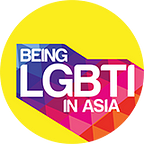Creating spaces to nurture innovations by next-gen LGBTI entrepreneurs
By Jawying Honey Lyster and Sneha Pathak
The entrepreneurial ecosystem is booming across Asia and the Pacific. However, young LGBTI innovators have had limited opportunities within this ecosystem to showcase their solutions meant for their communities. Therefore, in late 2020, Youth Co:Lab India and the Being LGBTI in Asia and the Pacific Programme came together to give that opportunity to the young, diverse, brilliant LGBTI youth across India.
Traditionally, exclusion from this ecosystem is perpetuated by existing stigma and discrimination against LGBTI persons in all aspects of life. This includes inequitable access to employment opportunities, health services, and education. COVID-19 only served to amplify these existing societal fissures and accentuated the need to develop interventions for young LGBTI persons, that are led and created by young people.
Entrepreneurship is often seen as the much-needed catalyst to trigger socio-economic transformation. For instance, with dwindling employment rates in many APAC countries including India, entrepreneurship has been positioned as a viable career option for young people. And just as all others, the existing enterprises too have been adversely impacted by the pandemic. A recent Youth Co:Lab India report suggests that among the handful LGBTI entrepreneurs, 71% were negatively impacted by COVID-19, while only 44% are confident that their businesses will recover after the pandemic.¹
This triggered the development of a first-of-its-kind initiative in India: Innovations Marketplace for Gender Equality (IMGE), ambitiously launched in December 2020, in amidst the COVID pandemic. Focused exclusively on solutions related to Gender Based Violence (GBV) and increasing livelihood opportunities for young LGBTI persons. Led by Youth Co:Lab India and Being LGBTI in Asia and the Pacific, in collaboration with Atal Innovation Mission (NITI Aayog) the initiative was facilitated and organised by LGBTI practitioners and mentors. It became an interactive platform for youth LGBTI persons to develop and launch their innovative solutions for issues encountered by their communities.
Launching such an innovative platform, specifically for LGBTI-focussed solutions, did come with its own risks. When surveyed, young LGBTI people in India, did not view entrepreneurship as a viable career option due to the lack of support systems, financial safety nets and previous formal mentorship opportunities. The success of the programme though speaks volumes to the real demand for these kinds of platforms — over 100 LGBTI youth innovators applied, of which 20 unique entrepreneurs, social innovators and youth leaders were selected to join the three-month intensive mentorship and incubation programme. The curriculum and mentorship sessions focused on developing skills such as financial management, design thinking, building a business model, professional networking skills, and other business skills crucial to turning their ideas into viable, sustainable social enterprises.
The cohort largely comprised of nascent and early-stage entrepreneurs, most of whom had never been exposed to any entrepreneurial or business training. The varied online sessions, set against the backdrop of COVID-19, enabled the young entrepreneurs to learn online at their own pace whilst also ensuring that they were developing worthwhile skills and building their capacity as advocates. This was especially useful for those who were faced with unemployment or out of school as result of the pandemic, a reality faced by many LGBTI Youth across the region.² This would be their first opportunity to receive formal orientation and eventually pitch their diverse innovative solutions to a panel of judges. Examples of solutions include: activities focused on enabling education and employment for transgender and gender non-conforming children, co-working safe spaces for LGBTI youth, and leveraging technology to provide mental health services to LGBTI persons.
Innovator Spotlight
The top 10 winners from the Incubation programme would join the Youth Co:Lab Springboard Programme that offers mentorship, networking opportunities, a robust entrepreneurship LMS, among many other benefits! The winners will also be mentored by the regional Being LGBTI In Asia and the Pacific initiative and its vast network of private sector and civil society partners.
These kinds of partnerships, and public-private solidarity are critical to build an enabling environment for economic inclusion of LGBTI youth that provides equitable access to opportunities.³ While initiatives such as the IMGE are important to recognize and support LGBTI innovators, systemic changes in the socio-economic, cultural and political spheres are needed so that no voice is diminished and no need unmet.
These platforms need to be replicated across Asia and the Pacific in order to foster a new generation of LGBTI young entrepreneurs and give them access to the flourishing entrepreneurial ecosystem, whilst also equipping them with skills and mentorship for their ideas so that they can be shaped into tangible, impactful solutions for their communities, especially in a post COVID-19 world.
Special thanks to Ke Lin, Youth Social Entrepreneurship and Innovation Consultant, UNDP BRH for her support in this initiative.
Many thanks to Pallavi Singh, Communications Consultant, UNDP India for her support in editing the blog.
This initiative is part of the ongoing partnership between Youth Co:Lab and the Being LGBTI in Asia and the Pacific Programme
For more information please contact:
Sneha Pathak, Programmes and Partnerships (Youth) Officer, UNDP India, sneha.pathak@undp.org
Jawying Honey Lyster, Programme Manager a.i., HIV, Health and Development, UNDP Bangkok Regional Hub, jawying.lyster@undp.org
[1]: Impact of COVID-19 on Youth-Led Social Entrepreneurship https://in.undp.org/content/india/en/home/library/poverty/Impact_of_COVID19_on_Youth_Led_Social_Entrepreneurship.html
[2]: Socio-economic impact and social protection for key populations and young people living with HIV in the time of COVID-19 https://medium.com/being-lgbti-in-asia/socio-economic-impact-and-social-protection-for-young-key-populations-and-young-people-living-with-222d18950d91
[3]:Three Ways the Private Sector Can Advance LGBTI Rights and Inclusion https://www.asia-pacific.undp.org/content/rbap/en/home/blog/2018/three-ways-the-private-sector-can-advance-lgbti-rights-and-inclu.html
